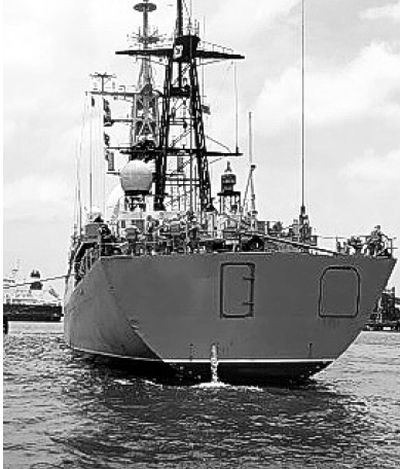(Trinidad Guardian) For the third time this year, Russian intelligence gathering ship Viktor Leonov has visited Trinidad and Tobago. This time, however, it was moored in Point Lisas, Couva.
A source told the T&T Guardian that this time around the ship was not in the open where the public could see it like when it was berthed near the Hyatt Regency, Port-of-Spain, on previous occasions. The source added that on its latest visit, only people on other ships and persons who had business to conduct with the ship could see it. The vessel was in T&T waters for five days and left Point Lisas on March 30.
With the economic and political turmoil in Venezuela and the US influence in Jamaica, T&T is a more favourable port of call for the CCB-175 Viktor Leonov to refuel and replenish its stores.

This is the assessment of Steffan Watkins, a Canadian-based independent open source intelligence (OSINT) analyst with an interest in Russian naval auxiliary movements, who has been following this ship since she had her maiden voyage and shake-down in the summer of 2015.
The T&T Guardian asked Watkins on Friday via email what was the purpose of the vessel in T&T.
Watkins said, “The Viktor Leonov is at sea for about six months on a Western Atlantic deployment every year or so, and by watching its patterns of movement you can see it restocks regularly every 30-45 days.
“After all, like all ships, they have a limited amount of space at their disposal to store food and supplies. They visited Port-of-Spain in January, again in February and once again last week, March 26 to March 30 to restock their stores.
“I had expected them to show up in Havana in the middle of their deployment, as they usually do, so I was surprised when they arrived in Port-of-Spain a second, then a third time this year, after restocking in Havana from March 16 to March 19.
“Last year they stopped in Kingston Jamaica first, then Havana Cuba; maybe this year’s stop in Trinidad and Tobago signals a change in economics? Maybe they’re getting a better deal in Port-of -Spain than they were able to get in Kingston?”
Watkins speculated it was possible recent American influence in Jamaica changed the climate for the Russian vessel and they felt it would be better to take their business elsewhere.
He said there could very well be an economic or political reason for that decision, but it was hard to tell since the Russians did not publicise these sort of intelligence operations very much and the reasons they changed locations might not be flattering.
Last year’s seemingly successful and uneventful stop in Jamaica, he thought, would be an omen of subsequent stops in Jamaica, but that didn’t happen this year. Instead, the Leonov sailed further away from their target, the US East Coast, to T&T three times.
When asked if he felt the current situation with Venezuela and Guyana had something to do with the ship’s presence in T&T, Watkins said the only link was proximity, but with upcoming Trinidadian and American military exercises, the Viktor Leonov would be perfectly suited to monitor their communications and weapons systems.
Asked why was there so much US intelligence activity, such as a US military C-32B special ops planes that had recently been landing in T&T, Watkins speculated that if the Russian Navy were looking for a friendly port to conduct restocking and refuelling more regularly, the Americans would likely be looking to sink that plan.
While Americans cannot legally force the Russian ship to leave the international waters near the US, they can try and starve them, ensuring they have the longest trip to restock food and supplies possible, he suggested, noting T&T could be in the middle of a larger tug of war between United States and Russia. He said it was unclear if the Americans visited T&T as a reaction to the Russians, or if the Americans’ recent participation in ISIS-related operations in T&T were partially the cause of the Russian’s choice of port.









